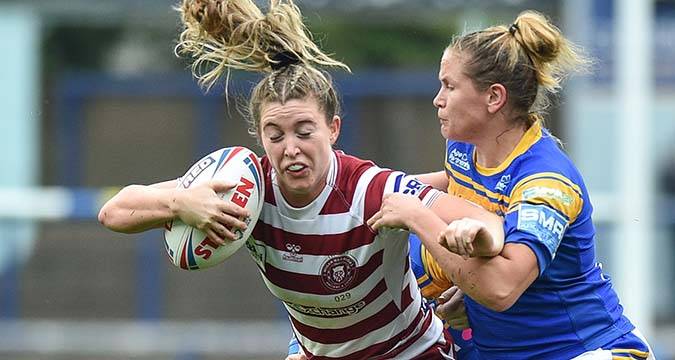
WIGAN are likely to become the third club to announce that it will pay the members of its women’s team in 2023, League Express understands.
With Leeds and York now committed to providing payments to their female players, it appears that the Warriors will be next, with a source at the club telling League Express that they are looking favourably at the issue.
St Helens, who supplied England with eleven players for the World Cup, are still pondering their stance, while newly promoted Warrington and Huddersfield, whose team is run by their Community Trust, have confirmed their players will remain unpaid.
Every club stated the need to professionalise off-field operations while Saints Chairman Eamonn McManus suggests that the game has missed an opportunity to introduce player payments in a co-ordinated manner.
“We’ve not firmed up on our stance yet [for player payments in 2023], but we want to get in a position whereby the women’s game improves in terms of coaching, medical facilities, insurance and the like,” said McManus.
“If it’s going to be professional, it needs a framework that is going to be professional. Once those minimum standards have been achieved, we can then create a commercial standalone value and then the ladies can benefit. But it has to be led by the governing body.
“Individual clubs setting pay levels alone isn’t the right way to go about it. St Helens have been promoting Women’s Rugby League for a great amount of time and have invested a lot of time and energy in it.
“We want to see the ladies game develop, but it’s got to be done in a professional and co-ordinated manor in conjunction with the regulatory body and with advice by IMG.”
McManus did accept that such a co-ordinated approach is no longer possible with Leeds and York having jumped the gun, and that his players could be unhappy if they are not recompensed this year.
“We don’t know, but [other clubs announcing payments] doesn’t help,” he said in response to the latter issue.
Warrington’s Karl Fitzpatrick explained why they won’t be paying their women’s team in 2023.
“We would love to, but our last accounts show a loss of a million pounds,” he said.
“To then employ another 25 to 30 staff would be a dereliction of directors’ duties. We can’t do that.
“We’re trying to provide parity with the men in terms of facilities, staff, analysts, doctors etc, and all that comes at a cost. Clubs aren’t in a fantastic financial position, so it wouldn’t be wise, but the women’s game is of strategic importance to us.
“We will look again for 2024, but we’d have to see a significant improvement in the game’s financial position, and there isn’t a TV deal in place for next year yet. My daughter has played from six and is now 14, and she wants to be a professional player, so I do see it from both sides.”
Gary Hetherington, the chief executive of Leeds, precipitated this issue late last year when he agreed to pay their players from this coming season onwards.
“It’s being funded through the commercial income that the women’s game is now generating, which includes the sponsor of the women’s team,” he said.
“There is a value attached for being the sponsor of a women’s team. That income should flow back to pay the women’s team and staff. In any sport, the elite players should aspire to be recompensed for their abilities.”
Hetherington, who has yet to finalise what his players will receive, resisted the suggestion that it would be a bad look for a top club to refuse to pay its players in 2023.
“That’s not necessarily the case because everyone is at where they’re at, but the opportunity is there for all clubs to commercialise their women’s team,” he said.
“The commercial value is there. We got 4,500 at Headingley when we played Saints in the 2021 Grand Final. When England were on TV, the figures showed there’s a lot of broadcast value there. What’s needed is clubs to grasp this opportunity and elevate their players and teams to a semi-professional level.”
Hetherington also revealed that he wouldn’t necessarily seek to sign leading players from clubs who won’t be paying their players.
“Part of the plan is for the clubs to grow their player-supply base,” he said.
“Our focus is primarily the Leeds region and to encourage the local clubs to play women’s rugby. Numbers are growing all the time. They were growing before the World Cup, and the success of the World Cup will have done nothing but enhance the demand for women’s Rugby League.”
